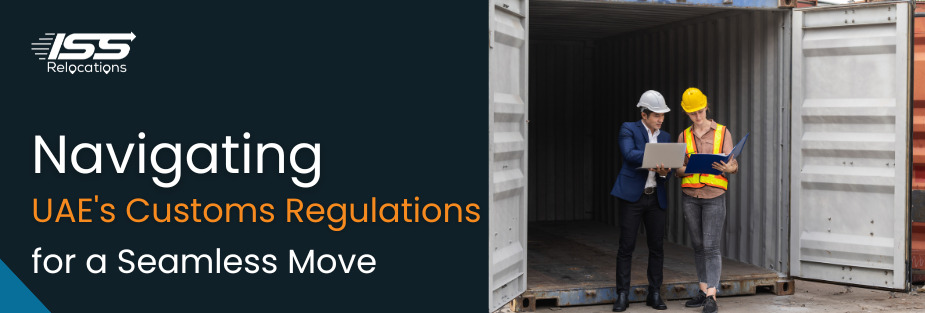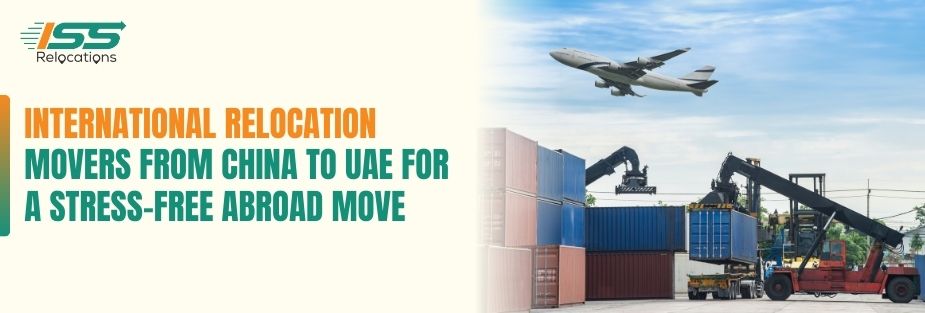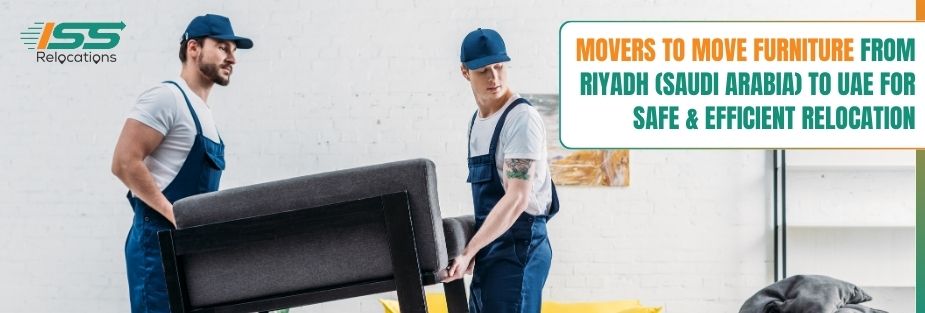
Navigating UAE Customs Regulations for a Seamless Move
Relocating to a new country can be an exciting yet challenging experience, especially when it comes to navigating customs regulations. For those moving to the UAE, understanding UAE customs regulations is crucial for a smooth transition. These regulations govern the importation of personal belongings and household goods, ensuring compliance with local laws and preventing unnecessary delays or fines. By partnering with ISS Relocations, you can benefit from expert guidance and support, making your move to the UAE as seamless as possible.
Understanding UAE Customs Regulations
What are UAE Customs Regulations?
International Relocation, Customs regulations refer to the rules and procedures established by a country’s customs authority to control the import and export of goods. These regulations are designed to protect the country’s economy, environment, and security by monitoring the flow of goods across its borders. In the context of the UAE, customs regulations encompass a wide range of requirements, including documentation, duties, and inspection protocols, which must be adhered to for successful importation.
UAE Customs Regulations
Begin Your Hassle-Free Moving Experience Today
Importance of Compliance
Compliance with UAE customs regulations is essential to avoid potential issues such as fines, confiscation of goods, or legal complications. Failure to adhere to these regulations can lead to significant delays in the clearance process, resulting in increased costs and inconvenience. Ensuring compliance not only facilitates a smoother transition but also helps maintain a positive relationship with local authorities. Partnering with experienced professionals like ISS Relocations can provide invaluable assistance in navigating these regulations, ensuring that all necessary documentation is in order and that the entire process is handled efficiently.
UAE Customs Regulations – Documentation Required
Essential Documents for Customs Clearance
When moving to the UAE, ensuring you have all the necessary documents for customs clearance is critical.
The key documents required under UAE customs regulations include:
- Certificate of Origin: This document certifies the country in which the goods were manufactured.
- Commercial Invoice: A detailed invoice listing the items being imported, their value, and other pertinent details.
- Packing List: A comprehensive list of all items in the shipment.
- Bill of Lading: A document issued by the carrier acknowledging receipt of the cargo.
- Exemption Letters and Health Certificates: Required for certain goods, such as pharmaceuticals or food items.
Specific Requirements for Different Goods
Different types of goods may require additional documentation under UAE customs regulations. For example, importing food products necessitates health certificates to ensure they meet safety standards. Pharmaceuticals require specific import licenses and certifications. Additionally, live animals must be accompanied by health and vaccination records. Understanding these specific requirements is crucial for a smooth customs clearance process, and partnering with a knowledgeable relocation service like ISS Relocations can greatly assist in managing these details.
Customs Duties and Taxes
Duty and VAT
Under UAE customs regulations, customs duties and Value Added Tax (VAT) are levied on most imported goods. Customs duties are typically calculated at 5% of the total value of the goods, including cost, insurance, and freight (CIF). VAT is generally applied at a rate of 5% on the import value plus any applicable customs duties. Understanding how these charges are calculated is essential for budgeting and planning your move.
Additional Charges
In addition to customs duties and VAT, there may be other charges to consider when importing goods into the UAE. These can include storage fees for goods held at customs, inspection charges for certain items, and administrative fees for processing documents. Being aware of these potential additional costs can help you avoid surprises and ensure a smoother relocation experience. Utilizing the services of ISS Relocations can provide valuable assistance in navigating these costs, ensuring that all aspects of the move are managed efficiently and within budget.
Read Also: Customs in South Africa: A Complete Guide For Omani Expats
Customs Departments in the UAE
Federal Customs Authority (FCA)
The Federal Customs Authority (FCA) oversees customs regulations and procedures across the UAE. The FCA ensures that all goods entering the country comply with UAE customs regulations, protecting the economy and security. It also coordinates with local customs departments to implement federal policies and facilitate efficient customs clearance.
Local Customs Authorities
Each emirate in the UAE has its own local customs authority responsible for managing customs processes within its jurisdiction. For example, Dubai Customs, Abu Dhabi Customs, and Sharjah Customs each handle the import and export of goods specific to their regions. These local authorities work in conjunction with the FCA to enforce UAE customs regulations and ensure seamless customs operations across the country.
Import Procedures
Step-by-Step Import Process
The import process in the UAE involves several key steps to ensure compliance with UAE customs regulations:
- Document Preparation: Gather all necessary documents, including the commercial invoice, packing list, and certificate of origin.
- Customs Declaration: Submit a customs declaration form online or at the customs office, detailing the shipment and its contents.
- Inspection: Customs officials may inspect the goods to verify the declaration and ensure compliance with regulations.
- Duty and Tax Payment: Calculate and pay any applicable customs duties and VAT.
- Clearance: Once all procedures are completed, goods are cleared for entry into the UAE.
Role of Customs Brokers
Customs brokers play a crucial role in navigating UAE customs regulations. They act as intermediaries between the importer and customs authorities, handling documentation, ensuring compliance, and facilitating the clearance process. By using a customs broker, you can avoid potential pitfalls and ensure a smoother import experience. ISS Relocations offers expert customs brokerage services, helping clients manage the complexities of customs regulations and ensuring timely and efficient clearance of their goods.
By understanding the intricacies of UAE customs regulations and following the proper procedures, you can ensure a seamless and hassle-free move to the UAE. Partnering with experienced professionals like ISS Relocations can provide invaluable support and expertise, making your relocation process smoother and more efficient.
Get Expert Help
Tips for a Seamless Customs Clearance
Preparation and Documentation
Proper preparation and accurate documentation are key to navigating UAE customs regulations smoothly. Start by ensuring that all required documents, such as the commercial invoice, packing list, and certificate of origin, are complete and accurate. Double-check for any special documentation required for specific items, such as health certificates for food products or import licenses for pharmaceuticals. Being meticulous with documentation can prevent delays and complications during the customs clearance process.
Common Mistakes to Avoid
Avoiding common mistakes can significantly ease the customs clearance process. Some frequent errors include incomplete or incorrect documentation, under-declaring the value of goods, and failing to adhere to specific regulations for restricted items. It’s also crucial to be aware of any prohibited items that cannot be imported into the UAE. By staying informed about UAE customs regulations and ensuring all paperwork is in order, you can avoid these pitfalls. Partnering with ISS Relocations can provide expert guidance and help you navigate the complexities of customs clearance effectively.
Wrapping Up
Navigating UAE customs regulations is essential for a successful relocation to the UAE. By understanding the necessary documentation, duties, and import procedures, you can ensure a smooth customs clearance process. Avoiding common mistakes and staying informed about specific requirements for different goods can prevent delays and additional costs. For expert assistance and a seamless move, consider partnering with ISS Relocations, your trusted guide in managing the complexities of customs regulations.
Plan Stress-free Move with Top Moving Company in UAE - ISS Relocations

Frequently Asked Questions
What are UAE customs regulations?
UAE customs regulations are rules and procedures established to control the import and export of goods, ensuring compliance with local laws and protecting the country’s economy and security
What documents are required for customs clearance in UAE?
Essential documents include the commercial invoice, packing list, certificate of origin, bill of lading, and any specific certificates for certain goods, such as health or exemption letters.
How are customs duties calculated in the UAE?
Customs duties in the UAE are generally calculated at 5% of the total value of the goods, including cost, insurance, and freight (CIF). Additionally, a 5% VAT is applied to the import value plus any applicable customs duties.
Do I need a customs broker for clearance in the UAE?
While not mandatory, hiring a customs broker can simplify the process by ensuring compliance with UAE customs regulations, handling documentation, and facilitating efficient customs clearance.
What is not allowed in Dubai customs?
Prohibited items include narcotics, firearms, gambling devices, and certain publications. ISS Relocations offers expert guidance on UAE customs regulations, ensuring your belongings meet compliance requirements for a seamless move.
How much can I import without paying duty in the UAE?
You can import personal items duty-free if their value does not exceed AED 3,000. ISS Relocations ensures all documentation and customs processes are handled efficiently, simplifying your move under UAE customs regulations.
What items are not allowed in checked luggage UAE?
Restricted items in checked luggage include flammable materials, lithium batteries, and sharp objects. ISS Relocations provides detailed advice on UAE customs regulations, ensuring your belongings comply with airline and customs rules for a smooth transition.
Moving Company - Recent Blog
Stay informed and prepared for your next move with our latest blogs on moving services in the UAE. From expert packing tips to international relocation guides, ISS Relocations brings you up-to-date insights to make your moving experience smoother, safer, and stress-free.










